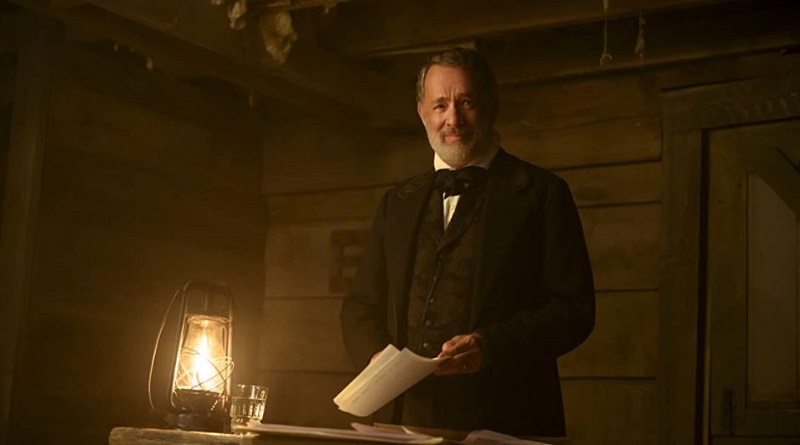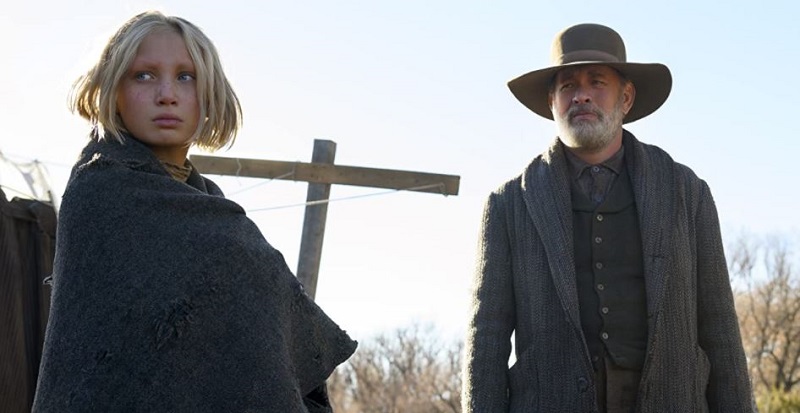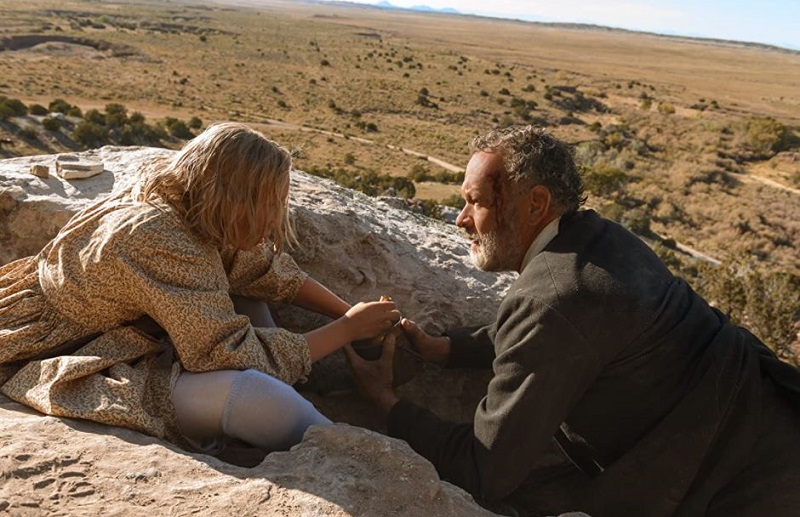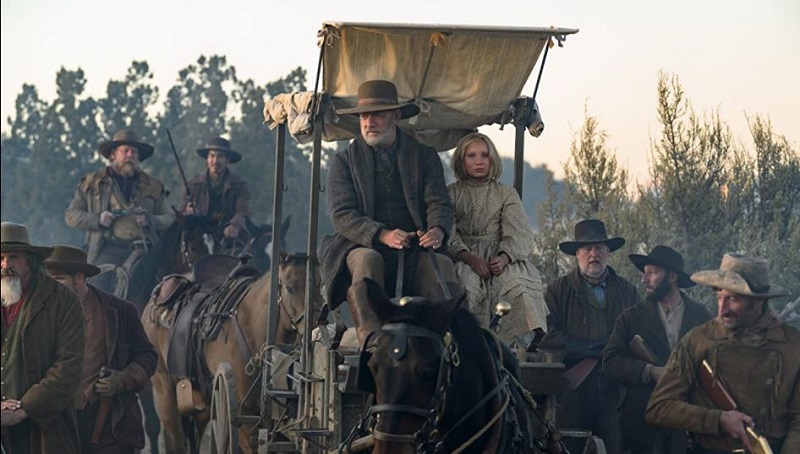Tom Hanks has accomplished much as an actor—from going to space to being stranded on a deserted island, the two-time Oscar winner has seemingly done it all. What he hasn’t done is star in a western and that gets crossed off his list in the most triumphant of ways with Paul Greengrass’ News of the World, based on the bestselling book by Paulette Jiles.

Captain Jefferson Kyle Kidd (Hanks) is a veteran of the Civil War from the side that lost. The Texan traipses across 1867 America reading the News of the World to eager audiences who dot the West and share one thing in common—they are all too busy working from dusk to dawn to catch up on the goings-on of the world, locally and nationally. Enter Kidd and his news reading fellow and there is something about a storyteller that can whisk us away from the perils of everyday life.
What better person to embody that character than Hanks?
Almost immediately, he comes upon a little girl who has now been orphaned twice. Once when her family was wiped out by Kiowa Native Americans and then when they captured her and raised her as one of their own, the American military would orphan her once again when her people were slaughtered. When she was being delivered to her aunt in uncle in south Texas, the convey was attacked and she was the only one to survive. It is there that Captain Kidd and Johanna (Helena Zengel) first cross paths when he agrees to take her to her only remaining family, an aunt, and an uncle. They live in a southern Texas town near where Kidd hails from, and it can serve as an opportunity to go home for him for the first time in half a decade.
The crux of this tale takes place on the road as the Captain and his reluctant passenger navigate the rough, treacherous, and vast land that stands in front of them. The war veteran has a rickety carriage, two horses and when it comes to weapons, he merely possesses a shotgun that only has buck shots for shooting birds. Around every corner, one can palpably sense danger. That is one of the (many) things that director Greengrass impeccably expresses through this particular story. After the Civil War reached its conclusion, it’s not like those in the south just cleaned up the carnage and rejoined the Union joyously. The animosity is palpable. What is so striking is that even though the Confederate Army surrendered, there are countless souls who believe it is up to them to continue to fight to “maintain their heritage.” Hear that phrase anywhere lately?!
These same folks believe that those Union “blue coats,” who permeate the countryside and burgeoning cities of Texas (and across the south for that matter), serve two purposes. They’re there to enforce the peace and to serve as a constant physical manifestation of a war lost. Even if the tension feels as if it could escalate to violence quickly between those gathered to hear the News of the World from Hanks’ character, this aspect is a fascinating one and something Kidd has a gift for cutting with a verbal knife.
Before their perilous road trip truly gets going, Greengrass and his script co-writer Luke Davies have established the tenor of the area, adding layers to the tension and the infinitesimal line that Captain Kidd must straddle over the next couple of weeks that it will take them to make the journey. There are also countless wild cards thrown in—such as disgruntled southerners, Native Americans consumed by revenge, and even an entire town run by a madman who feels it’s his personal mission to live life as if the Confederate Army won the war. Making matters worse, it is revealed that not only was the south left to build themselves back up (initially, at least), but they were being charged for “war debt” by the government that did nothing but add countless layers to that boiling animosity.
The connection between our two leads is the key to the entire cinematic endeavor. Zengel is Johanna and News of the World is her talent announcement. Not only can she effortlessly go from stoic to spazzy, but she and Hanks have the most eloquent of chemistries. If these two don’t gel, the entire thing goes south. The German-born Zengel is remarkable, capable of going from feral, to fierce to heartbreakingly vulnerable in what seems to be effortless.
Johanna doesn’t remember her natural heritage. When Kidd tries to converse with her in basic German… nothing. Yet, while speaking to him in the language of the Kiowa people, a German word gets thrown in out of the blue and that, without expressing it verbally, strikes the Captain in the most potent of ways. There is a wildfire of trauma circling through this girl’s head and what is best for her may not be what lies ahead for her with her aunt and uncle. There’s complicated, and there’s the what to do with Johanna question.

The concept of what defines “home” arises from the pages of Jiles’ book, and it is smartly and effectively portrayed in Greengrass’ film. For someone like Johanna, the government (those blue coats), has deemed it belongs down the road with her aunt and uncle. For the girl herself, it feels as if it should be with the Kiowa tribe, even though they’re lost, dispersed, and decimated. It’s a tragic situation and making matters more complex is there truly isn’t a way for the girl to communicate her will, even if she knew. This is all captured by Zengel in a performance that seems as if it would be a seismic challenge, it’s hard to believe the young woman is only twelve.
Audiences have become so accustomed to Hanks delivering performances that are out of this world. Earlier this year, he was mesmerizing in Greyhound. Yet again he dazzles with News of the World. There is something distinctive about what he delivers with his latest. The actor not only illustrates why he is a national treasure, but the most reliably stellar thespian. Just as there is no one else in the world who could have carried Cast Away as he did, after witnessing the legend as the Captain, it is impossible to imagine anyone other than him as the character.
Much has been made that this is Hanks’ first western. There is something incredibly unique about the genre that has made it a favorite for countless folks over the last century of moviemaking. There is no escaping that it was a wild landscape of lawlessness and total and utter disregard for anyone who is not white and male. Enter Hanks’ “everyman” persona, who he does better than anyone, and it seems as if that soul would be lost in such an arena. Yet, he is a war veteran, a leader of men, and as Kidd and Johanna traipse across Texas, we are served a lesson in don’t judge a book by its cover. Who better to be that “guy” than Tom Hanks?

Greengrass, who has blown us away on so many occasions—whether it is the Bourne movies, United 93, or even his Hanks starring Captain Phillips—also makes his western debut with News. He brings a storytelling sensibility that matches the genre and what audiences have come to expect from it. The filmmaker excels at bringing out the heart of his characters early in the first act, all while interspersing action, tension, and even a bit of exposition that compels us from the get-go. There is also a shorthand between the director and Hanks that plays a significant role in pulling us into the tenuous world of the “old west.” Both are operating at a level that is exactly what this story requires in order for audiences to get the most out of the entire experience.
There is an epic feel to a story that is truly being driven by emotion. Playing a subtle part in that is the exquisite cinematography by Dariusz Wolski (The Martian) and the score by James Newton Howard (The Hunger Games, King Kong). They both set a tone that befits the source material, the tension that permeates this American time period, and add layers to the scope that enhances the emotive tether between audience and story.
One may think that shooting those beyond beautiful western views is a no brainer in the cinematography world. Sure, it helps when what is at the other end of your lens is that gorgeous. But what Wolski achieves is something beyond painting from a preordained palette. He incorporates where in the story we are and how the shot will reflect that, working in concert with composer Howard. Collectively they have provided an unexpected shot to the heart of the viewer that elevates the entire experience.

America, sadly, has quite a few dark spots on our lineage. News of the World doesn’t shine a spotlight on one of those periods per se, but it is impossible not to think about just how horrendous those white Europeans were to the land, the people who were indigenous to that land, and to each other. When a character such as Kidd does something as selfless as bringing a twice-orphaned girl to her kin, it provides much-needed brightness to a dimly lit world. In the hands of Hanks, Zengel, and Greengrass, it doesn’t atone for those sins, but it goes a long way in saluting souls that did the right thing during the wrong time.
Grade: A

